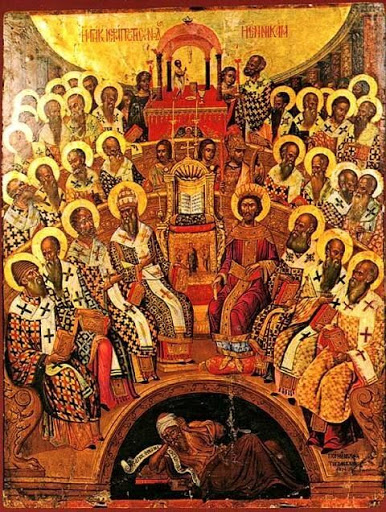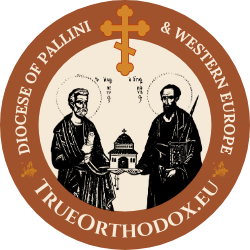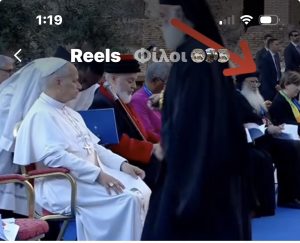THE CONCILIAR CHURCH AND THE CYPRIANITE HERESY

By Dr. Vladimir Moss
To know the truth, and to be united with others in knowing the truth – there is no greater joy than this. As David says: “What is so good or so joyous as for brethren to dwell together in unity?” (Psalm 132.1). “Jerusalem is builded as a city which its dwellers share in concord” (Psalm 121.2). How do we attain the truth? Here, tragically, lies the first cause of disunity, of estrangement from the truth. For the great majority of so-called civilized mankind believes that the answer is: in reason, in science. Only a minority believes that, besides reason, or science, there is another path to truth: Divine revelation. Moreover, the Christian part of that minority believes that only Divine revelation provides knowledge with certainty, knowledge of the really important things in life, knowledge that can really unite rather than divide people. Modern science has now existed for several hundred years. It promised much: not only truth, but happiness, no less. There is no sign that it is fulfilling its promises. Like the tree of the knowledge of good and evil, it looks good on the outside, but its aftertaste is bitter, deadly even. Scientists have learned an enormous amount about a great deal of unimportant things. The greatest scientists recognized with humility that there were many things, including all the most important things, which they did not know. Sir Isaac Newton believed in Divine revelation as well as science, and after his death it was discovered among his papers in Cambridge that he had written extensive commentaries on several books of the Old and New Testaments. In particular, he wanted to know when the end of the world would be, and using Daniel and the Book of Revelation rather than science, he came up with the date: 2060. There is no good reason to believe he was right, but at least he acknowledged that there is another spring of truth besides the mind of man: the Mind of God. Albert Einstein was not a Christian. But he did believe in the beauty of the universe, and that therefore there was an Author of that beauty: God. And so he declared: “God does not play with dice,” for neither beauty nor truth can come from mere chance. Unfortunately, the great majority of modern physicists do not agree with him, but believe the truly fantastical proposition that everything came out of nothing, or rather, from a tiny handful of super-heated dust that appeared out of nowhere, by chance, completely by chance. Truly did David say of such men: “The fool hath said in his heart: there is no God.” The whole truth about everything important came to man through Divine Revelation. First, the truth about the creation of the world and man and the fundamental principles of individual and social life were revealed by God to Moses and the prophets. Then the truth about how to be saved and enter into eternal life was revealed by God through His Son, the Lord Jesus Christ. And finally, the truth about the end of the world and the Last Judgement was revealed by God through Christ and his holy apostles. God has not ceased to reveal further truths about great and small things down the ages; but all the great foundational truths are contained in God’s Word, the Holy Scriptures of the Old and New Testaments. Unfortunately, man’s mind is curious, proud and fallen. And so from the beginning “there crept in certain men unnoticed, who long ago were marked out for this condemnation, ungodly men who turn the grace of our God into lewdness and deny the only Lord God and our Lord Jesus Christ” (Jude 3). They disputed and distorted the truths of Divine Revelation even while pretending to believe in them; “suppressing the truth in unrighteousness” (Romans 1.18), they fell away from the truth and led all who believed in them out of the Church and into the abyss of heresy. However, God has a remedy for this: the spring of truth that is the One, Holy, Catholic and Apostolic Church. The Church, being the Body of Christ Himself and filled with the Holy Spirit, “the Spirit of truth”, is called “the pillar and ground of the truth” (I Timothy 3.15). She, and she alone among all the world’s created institutions, is given the grace to know the truth and to discern all deviations from the truth. The organs of the Church’s revelation of truth and exposure of falsehood are the Councils of her leading bishops, especially the Seven Ecumenical Councils (325-787), but also several important Pan-Orthodox and Local Councils that have taken place in the last 1233 years. The Fathers of the first such Council, which took place in Jerusalem a few years after the Resurrection of Christ, recognized that the springs of the truth that they proclaimed were: the Holy Spirit, and their own enlightened minds working in concord. “For it seemed good to the Holy Spirit, and to us…” (Acts 15.28). If, therefore, we wish to know the truth about any important spiritual issue, we must turn to the life-giving springs of living water, the Councils of the Holy Fathers. So important is this fact that many of the services of the Church begin and end with the words: “Through the prayers of the Holy Fathers…” The Church is the Church of the Holy Fathers meeting in Council, and she even defines herself as Conciliar, which is very close in meaning to Catholic (the inspired translation of the Greek word “Catholic” in the Creed into the Slavonic of Saints Cyril and Methodius is “Sobornaia”, that is to say, “Conciliar” in English). In recent years, however, an attack on the Conciliarity of the Church has been launched in the context of the most important conciliar decision of recent times. The anathema against ecumenism, hurled by a Local Council of the Russian Church Abroad in 1983, declared all ecumenist churches who confessed the heretical branch theory of the Church, to be outside the Church. In the following year, a Greek hierarch in schism from his lawful hierarchy, Metropolitan Cyprian of Fili and Orope, issued his Ecclesiological Theses, which argued that heretics that have not been condemned specifically by an Ecumenical or Pan-Orthodox Council, remain “uncondemned” until condemned by such a Council. His unstated target was the Russian Church’s anathema of the previous year; he wished to say that the ecumenist heretics anathematized by the Local Council of 1983 were in fact “uncondemned” and therefore grace-bearing, albeit “sick”, members of the True Church. The falseness of the Cyprianite position is demonstrated by the story of the most famous of all heretics, Arius. First, Hieromartyr Peter, Archbishop of Alexandria, expelled him from communion in his diocese. This was a local decision, but its validity was contested by nobody – Cyprianism was unknown in those days. Then, some years later, when St. Peter was in prison, Arius feigned repentance, and several priests, including the future bishops Achilles and Alexander, came to St. Peter to entreat him to accept him into communion. However, St. Peter refused, saying: “Arius I refuse to accept, for he has been cast out of the Holy Church by God Himself and excommunicated not so much in accordance with my judgement as with God’s…” And then to Achilles and Alexander alone he said: “I call him accursed, not by my own judgement but by that of Christ my God, Who appeared to me last night. As I was praying, according to my custom, a brilliant light suddenly shone in my prison cell, and I beheld the Lord Jesus Christ in the guise of a youth twelve years of age. His face was more radiant than the sun, so that I could not bear to look upon the ineffable glory of His countenance. He was clad in a white robe torn from top to bottom, which He held to His breast with both hands to cover His nakedness. Seeing this, terror fell upon me, and I asked Him, ‘Who is it, O Saviour, that hath rent Thy garment?’ The Lord answered, ‘The mindless Arius rent it by dividing the people Whom I redeemed by My blood. Take care not to receive him into communion with the Church.’” Now the Church of God, the tunic of Christ, is always one, and cannot be divided within itself. Nevertheless, Arius is said to have divided it by his heresy, which can only mean that, without tearing the Church herself, he tore people away from the Church through his heresy. This in turn means that heresy divides heretics from the Church, not through any act of the Church’s hierarchy, but through the judgement of Christ Himself before the actions of any earthly hierarchs, whether in Local or Ecumenical Councils. The hierarchs of the earthly Church discern and obey and confirm the judgement of the Heavenly Church and of her Head, the Lord Jesus Christ. For He alone “killeth and maketh alive, bringeth down into hades and raiseth up again” (I Kings (I Samuel) 2.6), He alone “has the keys of hades and death” (Revelation 1.18) – together with those faithful hierarchs to whom He has given the power to bind and to loose from hades and death because of their discernment of His judgements. It is in this context that we can understand the Lord’s words to Nicodemus: “He that believeth not is condemned already” (John 3.18). Again, the Apostle Paul says: “A man that is a heretic… isself-condemned” (Titus 3.10, 11). So there can be no “not-as-yet condemned heretics”, as the Cyprianites affirm: all heretics are condemned immediately they preach heresy publicly, and are “false bishops” even “before conciliar condemnation”, as is explicitly affirmed by the 15th Canon of the First-and-Second Council of 861. The reaction to Cyprian’s false teaching on the Church’s conciliarity was swift: in 1986 a Council of the bishops of the True Orthodox Church of Greece under Archbishop Chrysostomos (Kiousis) of Athens defrocked him for schism and heresy. The Russian Church Abroad under Metropolitan Vitaly later confirmed the Greeks’ decision against Cyprianism in 2001, as did the Russian True Orthodox (Catacomb) Church under Archbishop Tikhon of Omsk and Siberia. So the ecumenists have been validly anathematized by the decisions of several Local Councils; they are outside the Church and deprived of the grace of sacraments. No further decision of a Pan-Orthodox or Ecumenical Council is required to “validate” those decisions, and Cyprian’s teaching that such a validation is required in order truly to cast the ecumenists out of the Church is false. In fact, all heretics, immediately they begin spewing their heresy publicly, are already “self-condemned” for blaspheming against “the theology on high”, falling under the pre-eternal curses of the primordial Council of the Holy Trinity, the Father, the Son and the Holy Spirit. For since the Church of Christ is Conciliar by nature, her bishops meeting in councils, whether big or small, whether Local or Ecumenical, are fully empowered to cast heretics out of the Church provided their decisions are consonant with the decisions of all previous Councils in that golden chain of sanctity and truth that constitutes the history of the One, Holy, Catholic and Apostolic Church. And so, as the kontakion for today’s feast declares: The preaching of the Apostles and the doctrines of the Fathers confirmed the one Faith of the Church. And wearing the garment of truth woven from the theology on high, she rightly divideth and glorifieth the great mystery of piety. May 18/31, 2020.Sunday of the Holy Fathers.St. Elgiva, Queen of England.







